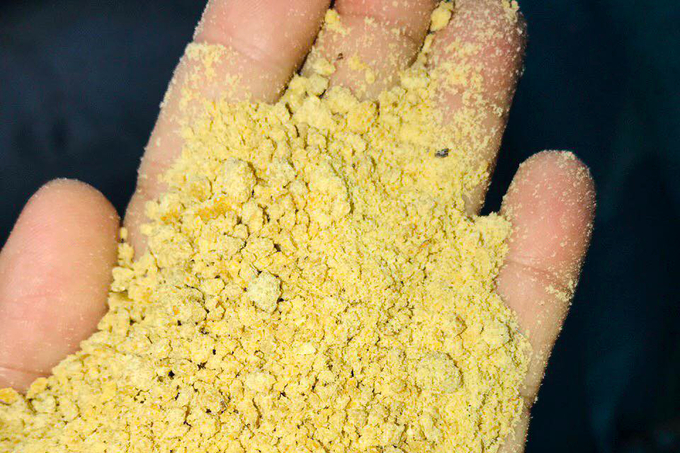May 20, 2025 | 10:23 GMT +7
May 20, 2025 | 10:23 GMT +7
Hotline: 0913.378.918
May 20, 2025 | 10:23 GMT +7
Hotline: 0913.378.918

Each year, Vietnam has to import about 5 million tons of soybean meal as raw materials for animal and aqua feed. Photo: Tran Trung.
While the costs of numerous animal feeds were falling in early 2023, the prices of soybean meal products were rising.
Soybean meal prices are rising and remaining at 10-year highs, according to the Mercantile Exchange of Vietnam (MXV). Argentina, the world's largest soybean meal producer (accounting for 41% of the worldwide soybean meal export market share), is facing low soybean output owing to bad meteorological conditions.
Argentina is experiencing an unusual late-summer heatwave, with temperatures reaching record highs and forcing crops to wilt. Argentina's Buenos Aires Grain Exchange (BAGE) cautioned in its weekly crop report that hot, dry weather is still affecting crops, with 62.2% of the land at a critical stage of growth. This year's soybean harvest is also threatened by early frosts.
In light of this, BAGE said it will continue to lower its forecast for the country's soybean production in 2022/2023 as crops deal with the consequences of drought and hot temperatures. This figure is presently projected to be 33.5 million tons, a 30% decrease from earlier estimates and far lower than the 41 million tons forecast by the US Department of Agriculture in its February 2023 report.
The likelihood of insufficient supply from the nation with the most sway over the global soybean meal market has prompted the price of this commodity to rise the most in the agricultural product category since the beginning of the year.

Soybean meal is the most important raw material in animal feed. Photo: Thanh Son.
Soybeans go through a solvent extraction procedure after being extracted from the soil. The meal is a good source of protein for animals.
With the significant expansion of the livestock, poultry, and aquaculture sectors in recent years, demand for soybean meal in Vietnam has been steadily expanding.
According to Nguyen Nhu So, Head of the Vietnam Animal Feed Association, Vietnam relies heavily on imported animal feed supplies, especially soybean meal. Imports will reach 5 million tons by 2022. Although import volume is second only to maize, the value of imported soybean meal is the highest since the import price is 70% higher than corn.
Soybean meal prices have consistently climbed by 60-70% in the past owing to the effect of global epidemics, weather, and geopolitical issues. Soybean meal is the primary source of vegetable protein in animal nutrition, and it is used to make aquatic bran and pig bran. As a result, the dramatic spike in soybean meal costs has had a direct impact on cattle pricing.
Raw ingredients typically account for 85-90% of the cost of manufacturing industrial animal feed. As a result, when the availability of raw materials changes, the price of animal feed is easily impacted by the chain effect, resulting in significant risks and expensive livestock products.
Soybean meal is the commodity with the greatest value proportion in feed components. As a result, while the global soybean meal price is around a 10-year high, the import duty on this commodity remains at 2%, increasing the financial burden for farmers.
As a result, on February 20, 2023, VAF issued an official dispatch to the Prime Minister, Ministry of Finance, and Ministry of Agriculture and Rural Development seeking a reduction in import duty on soybean meal. As a result, when the availability of raw materials changes, the price of animal feed is easily impacted by the chain effect, resulting in significant risks and expensive livestock products.
VFA stated that in the context of the government taking several efforts to contain inflation, while major imported commodities prices (energy, metals, cereals) remain anchored at high levels, Traditionally, one of the more effective solutions has been to levy a 0% import tax on soybean meal.
As a result, the association has requested that the Prime Minister, the Ministry of Finance, and the Ministry of Agriculture and Rural Development consider and reduce the import tax rate on soybean meal from the current 2% to 0% in order to support businesses in the animal feed industry that have boldly invested in production, thereby maintaining Vietnam's position as one of the world's leading animal feed producers.
Translated by Linh Linh

(VAN) Dong Thap farmers attained an average profit margin of 64% during the summer-autumn 2024 crop (first season), while An Giang and Kien Giang farmers followed with 56% and 54%, respectively.

(VAN) As a doctoral student doing research on renewable energy and electrification at Harvard University, the author shares his musings on electricity, nature, and countryside memories.

(VAN) The decree on Extended Producer Responsibility (EPR) ensures transparent management and disbursement of support funds, avoiding the creation of a “give-and-take” mechanism.

(VAN) Hue City rigorously enforces regulations regarding marine fishing and resource exploitation, with a particular emphasis on the monitoring of fishing vessels to prevent illegal, unreported, and unregulated (IUU) fishing.

(VAN) Hanoi People's Committee has issued a plan on reducing greenhouse gas emissions in the waste management sector with 2030 vision.

(VAN) Vietnam's draft amendment to Decree No. 156 proposes a mechanism for medicinal herb farming under forest canopies, linking economic development to population retention and the sustainable protection and development of forests.

(VAN) In reality, many craft village models combined with tourism in Son La have proven effective, bringing significant economic benefits to rural communities.